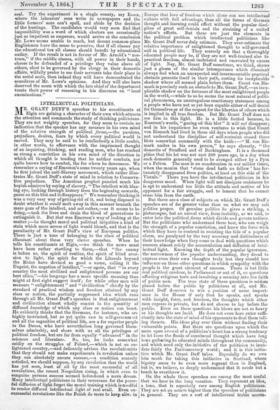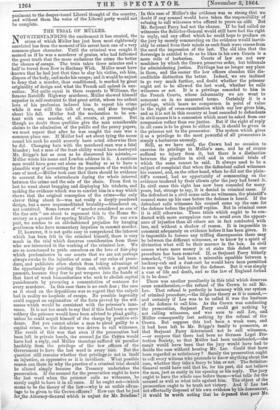INTELLECTUAL POLITICIANS. Europe that love of freedom which alone can
use intellectual culture with full advantage, than all the forces of German thought and learning could effect without the popular disci- pline of great self-denials and the straining of a united nation's efforts. But these are just the elements in the political problem which intellectual politicians like Mr. Grant Duff never duly estimate. They over-estimate the relative importance of enlightened thought to self-governed will in political life. They scarcely see that a thoroughly educated people may be, if they are not well-trained also to practical freedom, almost inebriated and enervated by excess of light. Nay, Mr. Grant Duff sometimes, we think, shows just a gleam of the similar intemperance which illuminati always feel when an unexpected and insurmountable practical obstacle presents itself in their path, casting its inexplicable shadow where all seemed plain before them. Count von 13is- mark is precisely such an obstacle to Mr. Grant Duff,—an inex- plicable shadow on the fortunes of the moat enlightened people in the world,—while to us he seems the most natural of politi- cal phenomena, an unscrupulous reactionary statesman among a people who have not as yet been capable either of self-denial for themselves or of the respect for the liberties of others which is implied in all true freedom. But Mr. Grant Duff does not see him in this light. He is a little fretted because, in Emerson's words, "gazing on this blot" it will not disappear; and in his impatience he even ventures to wish that Count von Bismark had lived in those old days when people who did not understand the discipline of self-restraint erased these blots somewhat summarily with the knife :—" M. von Bis- mark unites in his own person," he says cleverly, " the demerits of Strafford and of Buckingham. It is a thousand pities that his lot was not cast 200 years ago, in a day when such demerits generally used to be avenged either by a Pym or a Felton. The man is an anachronism in our milder times, when the maxim that stone dead hath no fellow ' has for- tunately disappeared from politics, at least on this side of the Vistula." There you have the intellectual politician in his dangerous mood. When light will not dissipate resistance ho is apt to understand too little the attitude and motive of his .opponent for a fair struggle, and to lament that he cannot erase him from the earth.
date fairly the Parliamentary world ; and it is this initia- tive which Mr. Grant Duff takes. Especially do we owe him much for taking this initiative in Scotland, where bigotry seems to be even more regnant than in England, but is, we believe, so deeply undermined that it needs but a touch to overthrow it.
On the whole these speeches are among the most useful that we hear in the long vacation. They represent an idea, a tone, that is especially rare among English politicians. They arc set an octave higher than the speeches of politicians in general. They are a sort of intellectual treble accom.
paniment to the deeper-toned Liberal thought of the country, and without them the voice of the Liberal party would not be complete.































 Previous page
Previous page